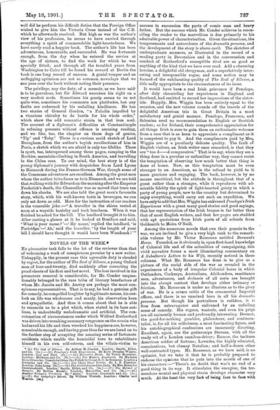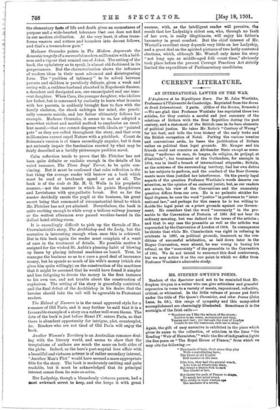NOVELS OF THE WEEK.*
No pleasanter task falls to the lot of the reviewer than that of welcoming a work of conspicuous promise by a new writer. Unhappily, in the present case this agreeable duty is clouded by regret, for the author of The Seal of Silence, a young Oxford man of four-and-twenty, died suddenly after correcting the proof-sheets of his first and last noveL The loss involved in his premature removal is considerable, for Mr. Conder unques- tionably belonged to the rare tribe of literary benefactors of whom Mr. Jacobs and Mr. Anstey are perhaps the most con- spicuous representatives. That is toy, he had a genuine gift for comedy, he compelled laughter by legitimate means, his out- look on life was wholesome and manly, his observation keen and sympathetic. And thus it comes about that he is able to reconcile us to a plot which, when stated in its bare out- lines, is undoubtedly melodramatic and artificial The con- catenation of circumstances under which Wilfred Rutherford was driven into wreaking summary vengeance on the cousin who had saved his life and then wrecked his happiness are, however, conceivable enough, and having gone thus far we are lured on to the further step of accepting the amazing series of fortunate accidents which enable the homicidal hero to rehabilitate himself in his own self-esteem, and the villain-victim to • 0..) The Seal of Silence. By Arthur R. Conder. London, Smith, Elder, and Co. [6s.]—(2.) Penelope's Irish Experiences. By Kato Douglas Wiggin. London : Gay and Bird. [6s.] — (3.) Derwent's Horse. By Victor Rousseau. London : Methuen and Co. [63.]—(4.) The Modern Argonauts. By Madame Eliza Orzeszko. Translated from the Polish by Count S. C. de Soissons. London, Greening and Co.168.]—(5.) The Three Days' Terror. By J. S. Pletcher. London: John Long. 6s.]—(6.) The Archbishop and the Lady. By Mrs. Schuyler Crowninshield. Lo on : Smith, Elder, and Co. [6s.]—(7.) The Helmet of Navarre. By Bertha Runkle. London : Macmilfan and CO. 1138.]—(13.1 Another Woman's nrritory. By "Alien." London : Constable and Co. [tie. ---(9.) Her Ladyship's Swat. By William West:W. London; Chatto an *Ultima. [Ga.] assume in succession the parts of comic man and heavy father. But the success which Mr. Conder achieves in recon- ciling the reader to the marvellous is due primarily to his admirable power of characterisation. Given the situations, the temperaments and antecedents of the dramatis persona, and the development of the story is above cavil. The sketches of undergraduate manners, as illustrated in the record of a reading party in Devonshire and in the conversation and conduct of Rutherford's susceptible rival are as good as anything of the kind that we have ever read. Add a charming heroine, a delightful old clergyman, and a. superlatively inter- esting and irresponsible rogue, and some notion may be formed of the exhilarating quality of The Seal of Silence, a title sadly appropriate to the circumstances of its issue.
It would have been a real Irish grievance if Penelope, after duly chronicling her experiences in England and Scotland, had omitted to record her impressions of the sister- isle. Happily, Mrs. Wiggin has been entirely equal to the occasion, and the new volume rounds off the travels of the delightful American trio in Great Britain in a most satisfactory and genial manner. Penelope, Francesca, and Salemina need no recommendation to English or Scottish readers; as for Ireland, their comprehensive appreciation for all things Irish is sure to gain them an enthusiastic welcome from a race that is as keen to appreciate a compliment as it is competent to pay it. And the compliments paid by Mrs. Wiggin are of a peculiarly delicate quality. The fault of English visitors, an Irish writer once remarked, is that they are "too d—d comparative." That is to say, when they see a thing done in a peculiar or unfamiliar way, they cannot resist the temptation of observing how much better that thing is done at home. Now, as this temptation must be even stronger to an American, so is the refusal to yield to it more gracious and engaging. The book, however, is by no means uncritical, but the attitude is throughout that of a guest rather than a stranger, while it reproduces with ad- mirable fidelity the spirit of light-hearted gaiety in which a party of young people, new to the country but determined to enjoy everything, would carry out such an expedition. We have only to add that Mrs. Wiggin has enlivened Penelope's Irish Erperiences with a great many good stories and good sayings, that her representation of the Irish brogue is far better than that of most English writers, and that her pages are studded with apt quotations from Irish poets of all schools from Goldsmith to Moira O'Neill.
Among the numerous novels that owe their genesis to the war, we are inclined to give a very high rank to the remark- able volume by Mr. Victor Rousseau entitled Denvent's Horse. Founded, as it obviously is, upon first-hand knowledge of Colonial life and of the actualities of campaigning, this vivid narrative forms a most illuminating commentary on A Subaltern's Letters to his Wife, recently noticed in these columns. What Mr. Rousseau has done is to give us a picture of the social side of the war as revealed in the experiences of a body of irregular Colonial horse in which Outlanders, Cockneys, Australians, Afrikanders, remittance men, adventurers, and declassis of all sorts are brought into the abrupt contact that develops either intimacy or friction. Mr. Rousseau is under no illusions as to the glory of war. He is a severe critic of the ornamental Imperial officer, and there is no unmixed hero in all his dramatis persona. But though his portraiture is ruthless, it is free from extravagance and enlivened by an unfailing sense of comedy. His rogues, wastrels, and even his prigs are all eminently human and profoundly interesting. Dermot, the good-for-nothing gambler, philanderer, and sentimen- tolist, is, for all his selfishness, a most fascinating figure, and his autobiographical confessions are immensely diverting.
Excellent, again, are the guttersnipe Stevens, with all the ready wit of a London omnibus-driver; Ramon, the taciturn American soldier of fortune; Lowndes, the highly educated,
conscientious, but clumsy Natalian ; and half-a-dozen other well-contrasted types. Mr. Rousseau, as we have said, is no
optimist, but we take it that he is probably prepared to endorse the opinions that he puts into the mouth of one of his characters :—" There's no doubt that war's no end of a good thing in its way. It stimulates the energies; the tre- mendous mental and physical strain develops character very much. At the least the very fact of being face to face with the elementary facts of life and death gives an earnestness of purpose and a wide-hearted, tolerance that one does not find in our modern civilisation. At the very least, it often trans- forms wasters and rotters and bounders into decent fellows, and that's a tremendous gain."
Madame Orzeszko paints in The Modern Argonauts the domestic tragedy of a successful modern millionaire with a bold- ness and a vigour that remind one of Jokai. The setting of the book, the upholstery so to speak, is almost old-fashioned in its gorgeousness. But the characterisation shows the influence of modern ideas in their most advanced and disintegrating form. The "problem of intimacy" to be solved between parents and children is peculiarly delicate, given a weak and erring wife, a ruthless husband absorbed in Napoleonic finance, a decadent and dissipated son, one emancipated and one inno- cent daughter. When Cara., the younger daughter, who idolises her father, but is consumed by curiosity to learn what is amiss with her parents, is suddenly brought face to face with the family skeleton, the shock unhinges her mind, she practi- cally commits suicide, and her father ultimately follows her example. Madame Orzeszko, it seems to us, has adopted a somewhat violent and morbid method to emphasise an excel- lent moral,—that one cannot dispense with ideals, or "painted pots" as they are called throughout the story, and that even millionaires cannot expel Nature with a pitchfork. Count de Soissons's version is at times exceedingly angular, but it does not seriously impair the fascination exerted by what may be fairly described as a luridly picturesque problem novel.
Calm reflection tends to prove that Mr. Fletcher has not been quite definite or realistic enough in the details of his weird romance, The Three Days' Terror, to be quite con- vincing. But it must be confessed that calm reflection is the last thing the average reader will bestow on a book which must be read at breakneck speed or not at all. The book is of the ecole de Mr. H. G. Wells in his prophetic manner,—not the manner in which he paints Hoopdrivers and Lewishams with sympathetic brush. But so far the master decidedly excels the pupil at the business, his great secret being that command of circumstantial detail to which Mr. Fletcher has not yet attained. Nevertheless, the book is quite exciting enough to while away a tedious railway journey or the wettest afternoon ever passed weather-bound in the dullest hotel sitting-room.
It is exceedingly difficult to pick up the threads of Mrs. Crowninshield's story, The Archbishop and the Lady, but the narrative is interesting enough when once this is achieved. But in this book again the reader must complain of a want of care in the treatment of details. No possible motive is assigned for the wicked St. Aubin's pleasing habit of blowing up liners by placing infernal machines on board. True, he manages the business so as to 9 cure a good deal of insurance money, but he spends so much of his wife's money (which she gives him quite willingly) on the construction of the machines that it might be assumed that he would have found it simplex and less fatiguing to devote the money in the first instance to his own use, and not trouble about the construction of explosives. The setting of the story is gracefully contrived, and the final defeat of the Archbishop in his desire that the heroine should take the veil will be agreeable to Protestant readers.
The Helmet of Navarre is in the usual approved style for a romance of Old Paris, and it may further be said that it is a favourable example of a story on a rather well-worn theme. The date of the book is just before Henri IV. enters Paris, so that there is abundant opportunity for intrigue, plot, counterplot, 8:c. Readers who are not tired of Old Paris will enjoy the book.
Another Woman's Territory is an Australian romance deal- ing with the literary world, and seems to show that the temptations of authors are much the same on both sides of the globe. Indeed, as the hero's post-nuptial love affair with a beautiful and virtuous actress is of rather secondary interest, "Another Man's Plot" would have seemed a more appropriate title for the story. The book is moderately exciting and quite readable, but it must be acknowledged that its principal interest comes from its mise-en-scbne.
Her Ladyship, though a blamelessly virtuous person, had a moat awkward secret to keep, and she keeps it with great success, with, as the intelligent reader will perceive, the result that her Ladyship's eldest son, who, through no fault of her own, is really illegitimate, will enjoy his father's baronetcy in great comfort. But the chief interest of Mr. Westalrs excellent story depends very little on her Ladyship, and a great deal on the spirited pictures of two hotly contested elections, which, although Mr. Westall only dates his story "not long ago, as middle-aged folk count time," obviously took place before the present Corrupt Practices Act strictly limited the expenditure of Parliamentary candidates.







































 Previous page
Previous page